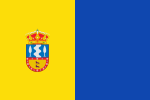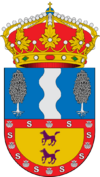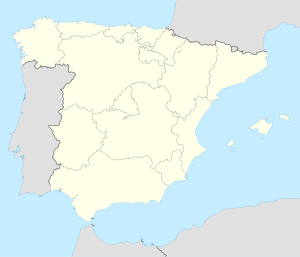Íllar facts for kids
Quick facts for kids
Illar, Spain
|
|||
|---|---|---|---|
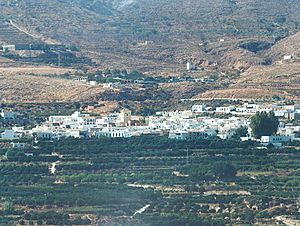
View of Íllar
|
|||
|
|||
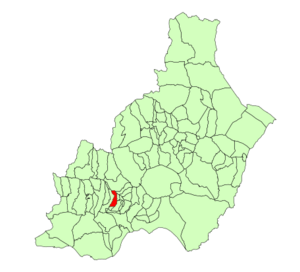
Illar, in red, shown in Almería
|
|||
| Country | |||
| Community | Andalusia | ||
| Municipality | Almería | ||
| Area | |||
| • Total | 19 km2 (7 sq mi) | ||
| Elevation | 425 m (1,394 ft) | ||
| Population
(2018)
|
|||
| • Total | 390 | ||
| • Density | 20.5/km2 (53.2/sq mi) | ||
| Time zone | UTC+1 (CET) | ||
| • Summer (DST) | UTC+2 (CEST) | ||
Illar is a small town, also called a municipality, located in the Almería province. This province is part of Andalusia, which is a special region in Spain.
Contents
How Many People Live in Illar?
This section shows how the number of people living in Illar has changed over the years.
| Historical population | ||
|---|---|---|
| Year | Pop. | ±% |
| 1999 | 468 | — |
| 2000 | 474 | +1.3% |
| 2001 | 458 | −3.4% |
| 2002 | 457 | −0.2% |
| 2003 | 435 | −4.8% |
| 2004 | 423 | −2.8% |
| 2005 | 419 | −0.9% |
| Source: INE (Spain) | ||
Where is Illar Located?
Illar is found near the river Andarax. It sits between two mountain ranges: Sierra de Gádor and Sierra Nevada.
Its borders touch several other towns. To the east, you'll find Huécija and Bentarique. To the west, it borders Instinción. To the north, it's next to Alboloduy, and a part of Bentarique is to the south.
A Quick Look at Illar's History
Illar in the Middle Ages
Illar was first mentioned by a geographer named Idrisi in the 1100s. He wrote about it as a place to settle and help collect taxes.
Later, in the 1200s, the Kingdom of Granada was the only Muslim area left in Spain and Portugal. Illar, along with ten other towns, was part of a region called Marchena's taha. This area was traditionally owned by the al-Nayar family.
Illar During the Renaissance
Christian armies took over Illar after they captured Baza and Almería in 1489. In 1494, the Catholic Monarchs gave the former Marchena's taha region to Gutierre de Cárdenas [es] y Chacón. This was a reward for his help in the conquest.
In the 1500s, there was a revolt, and later, many Muslims were asked to leave. After this, the town was empty for a while. People didn't start living there again until the 1600s and 1700s.
Illar in the Industrial Age
The 1800s brought big changes, including new ideas about freedom and the end of old land ownership rules in 1835. Illar and the other towns from Marchena's taha became their own municipalities.
During this time, more people moved to Illar because farming grew, especially the cultivation of grapes in Ohanes. The town became more prosperous, and you can still see this in some of the buildings from that time. A fountain, a public washing area built in 1871, a summer house, and the Town Hall were all constructed in a style called historicist.
This good economic period lasted until the 1930s. Then, a long drought and social problems related to the Spanish Civil War caused difficulties. The time after the war was hard, and many people left Illar to find work elsewhere.
How Illar is Governed
Illar is run by a City Council. People vote for their representatives every four years. Anyone living in Illar who is 18 or older can vote, including people from Spain and other European Union countries.
The City Council of Illar has 7 councillors. Their main office is located in the Plaza de la Constitución.
2007 Local Election Results
In the 2007 local election, the Partido Popular (People's Party, PP) won 5 councillors. The mayor, Antonio Sanchez Salmerón, was reelected. The Partido Socialista Obrero Español (Spanish Labour Socialist Labour Party, PSOE) won 2 councillors. Other parties, like Partido de Almería (PDAL) and Grupo Independiente por Almería (GIAL), did not win any seats.
Important Places to See
Civil Monuments
- Fountain and Washer: These were built in 1871 and are examples of the town's history.
Religious Monuments
- Santa Ana's Church: This church was built in the 1500s in the Mudéjar style, which mixes Christian and Muslim art. It has a beautiful wooden ceiling and a small Baroque-style front made of stucco.
See also
 In Spanish: Íllar para niños
In Spanish: Íllar para niños
 | Emma Amos |
 | Edward Mitchell Bannister |
 | Larry D. Alexander |
 | Ernie Barnes |


